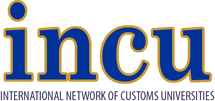 The Customs Cooperation Council which is commonly known as the World Customs Organization held its 125th /126th sessions from 11th to 13th June 2015 at its headquarters in Brussels. Professor David Widdowson, Mr. Ives Taelman and Dr. Edward Kafeero represented the International Network of Customs Universities (INCU) at the meeting.
The Customs Cooperation Council which is commonly known as the World Customs Organization held its 125th /126th sessions from 11th to 13th June 2015 at its headquarters in Brussels. Professor David Widdowson, Mr. Ives Taelman and Dr. Edward Kafeero represented the International Network of Customs Universities (INCU) at the meeting.
The Council Meeting is the highest and general annual meeting of the World Customs Organisation. Thus it deals with a wide range of issues concerning policy, technical, budgetary and financial as well as election matters.
The highlights of this meeting included the Secretary General’s progress report on the implementation of the WCO strategic plan which largely showed a positive balance of all the organization’s activities. The financial report for the year 2014/15 read by the chairperson of the finance committee Mr. W. Williamson (United Kingdom) was also positive as it portrayed the financial stability of the WCO.
Palestine was welcomed as the latest WCO member as of March 2015. The WTO Trade Facilitation Agreement (TFA) was discussed as high on the agenda. According to the OECD the TFA could globally generate between 12.5 % and 17.5% of savings in terms of trade cost. The Mercator Programme was at the heart of the discussions where it was re-confirmed as being the main vehicle to support the implementation of the TFA in the countries. The European Union confirmed a 400 million investment in Trade Facilitation.
Electing new office-bearers for heads of directorates for capacity building, compliance & facilitation, and tariffs & trade affairs was also very high on the agenda; and the winners are:
- Mr. Ernani Checcucci (from Brazil) – Director, Capacity Building
- Mrs. Ana Hinojosa (from USA) – Director, Compliance & Facilitation
- Mr. Liu Ping (from China) – Director, Tariffs & Trade Affairs
For the INCU, this was yet another important high level meeting that re-emphasized the importance of research and capacity building as key drivers of customs modernisation across the globe.
